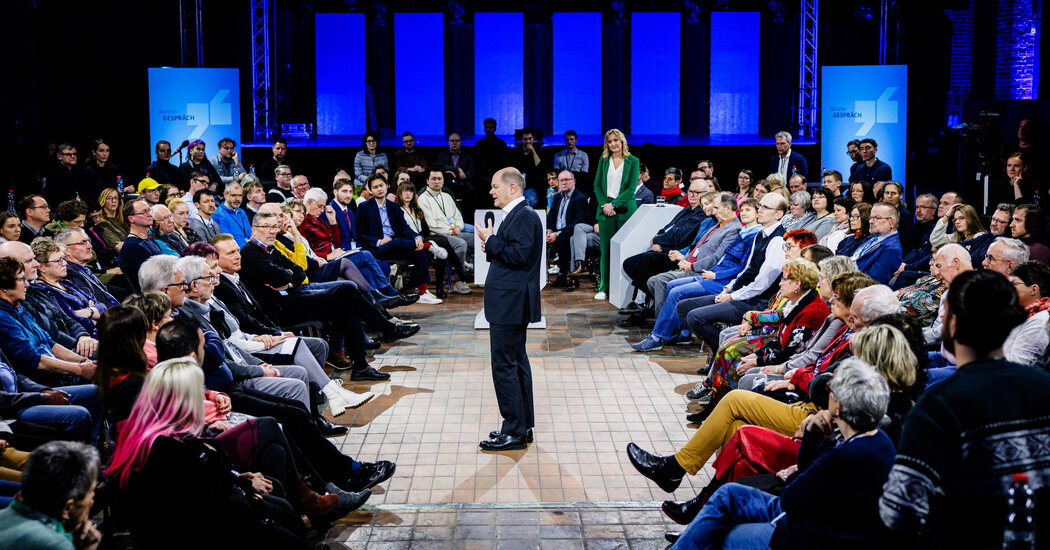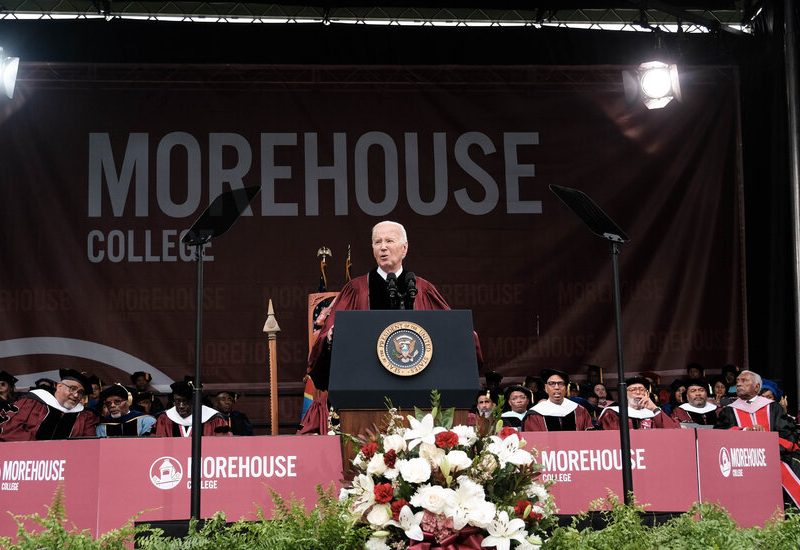First it was France’s president, Emmanuel Macron, who angered his NATO allies by suggesting that soon the West could be forced to send troops to Ukraine, portending a direct confrontation with Russian forces that the rest of the alliance has long rejected.
Then Chancellor Olaf Scholz of Germany took his own turn exposing new divisions. Trying to justify why Germany was withholding its most powerful missile, the Taurus, from Ukrainian hands, he hinted that Britain, France and the United States may secretly be helping Ukraine target similar weapons, a step he said Germany simply could not take. While neither Britain or France has commented officially — they almost never discuss how their weapons are deployed — Mr. Scholz was immediately accused by former officials of revealing war secrets.
“Scholz’s behavior has showed that as far as the security of Europe goes he is the wrong man in the wrong job at the wrong time,” Ben Wallace, Britain’s former defense minister, told The Evening Standard, a London daily. Tobias Ellwood, a Conservative who once chaired a key defense committee in the House of Commons was widely quoted in the British press calling the statement “a flagrant abuse of intelligence.”
Coming in a week when President Vladimir V. Putin threatened nuclear escalation if NATO troops entered the conflict, the tensions among Western allies underscored the ways they are struggling to maintain unity at a moment of apparent stalemate in the war and of flagging support, particularly in Washington.
For NATO the challenge now is to find some combination of new weapons and financial support without prompting a direct confrontation with Mr. Putin, never knowing precisely where that line is. It is a particularly difficult dance for Mr. Scholz.
Germany has provided more arms and promised more aid to Ukraine than any nation bar the United States — but Mr. Scholz has drawn the line at the Taurus, whose powers, he fears, could particularly provoke Mr. Putin.
Mr. Scholz’s problems deepened over the weekend when an intercepted 38-minute phone conversation between Germany’s air force chief and other officers was published by Russian state media, making it clear there were contingency plans if Mr. Scholz changed his mind and decided to send the Taurus system after all. The leak was widely interpreted in Berlin to be a Russian operation meant to stoke opposition toward giving Ukraine more aid.
It triggered investigations in Berlin, because the top officers were talking on an open line, giving the Russians an easy way to embarrass the German leader in front of NATO allies and before his own public at a moment when Germans remain hesitant about getting more deeply involved in the war.
Germany’s military confirmed the audio was authentic, but did not comment on its contents, including a discussion of the need for German involvement in running the system if it were handed to Ukraine.
At most, Germany appears to have available about 100 Taurus missiles, which have a longer range than the Army Tactical Missile System that the United States has provided, the British Storm Shadow or French SCALP missiles.
The European Parliament named the Taurus system among several that Ukraine needed in a nonbinding resolution that calls on all member nations to provide more weaponry. But it is far from clear that even if Germany did provide Taurus missiles to Ukraine, as President Volodymyr Zelensky has urged, it would make a decisive difference in the conflict.
Germany’s decision to send Leopard tanks last year did not enable Ukraine to mount a successful counteroffensive, and there are doubts about whether F-16 fighters, about to be delivered to Kyiv, will turn the battle now.
What Ukraine needs most, American officials say, is old-fashioned artillery shells to fend off inching Russian territorial advances, and air defenses against missile and drone attacks.
The reason not to give Ukraine the Taurus is simple, Mr. Scholz told voters at a town-hall event in Dresden on Thursday. While Germany will provide $30 billion in arms to Kyiv in the coming years, the Taurus can strike at a distance of 500 kilometers, or 310 miles.
That would place Moscow at risk, and he made it clear he did not trust that Ukrainian forces could restrain themselves from bringing the war home to the Kremlin. Nor could Germany be seen as targeting Russia directly without itself risking direct confrontation with Moscow.
Mr. Scholz noted that Germany had given and pledged more weapons than almost any other country in the world, giving it “the right to often say yes, but also — sometimes — ‘not this time.’”
But what got him in the most trouble was his description of how advanced missile systems could not simply be handed over to Ukraine; he suggested they needed NATO forces to do the targeting of the complex weaponry.
“What is being done on the part of the British and French in terms of target control and accompanying target control cannot be done in Germany,” he said, all but declaring that NATO allies were in direct control of the weapons systems they had provided. “What other countries are doing, which have other traditions and other constitutional institutions, is something that we cannot do in the same way.”
He said it was one thing to give weapons to Ukraine, and another for Germany to aim them at targets. “We must not be linked at any point or in any place to military targeting.”
But then came the leaked tapes, which included Gen. Ingo Gerhartz, the country’s highest ranking air force officer. General Gerhartz’s intercepted conversation captured him and other officers preparing for a classified briefing they were scheduled to give.
It described in detail how German soldiers would be needed for targeting, especially against difficult-to-hit objectives like the Kerch Bridge, which connects Crimea to Ukraine.
The officers discussed how Germany would be able to send only a maximum of 100 missiles, meaning every shot would have to count.
They also discussed how to help program the Taurus in ways that would avoid linking Germany to the targeting, and without being forced to put German soldiers into Ukraine. One option, they suggested, was to work quietly through the weapon’s manufacturer, or by ferrying the target data to Ukraine overland.
“In the worst case, I might even have to commute back and forth by car,” one officer said.
On Sunday, Roderich Kiesewetter, a member of the powerful parliamentary intelligence committee, said an unauthorized listener apparently dialed into the conversation and was not noticed by the officers.
On Sunday afternoon, Boris Pistorius, Germany’s defense minister, referred to the leak as a Russian “hybrid attack for disinformation” and called for a levelheaded reaction. “It’s about undermining our unity,” he told reporters.
In the town-hall meeting, Germans who asked the chancellor questions made it clear that they would rather their government spent more at home, and less on Ukraine.
The session started with a man asking the chancellor why he chose “the sword over the soul,” by which he meant delivering military aid to Ukraine rather than negotiations with Russia.
When, in his response, Mr. Scholz said that no German or NATO soldiers would be deployed in Ukraine, he received an ovation.
The topic of military support has become more fraught than ever, especially in the former East Germany — including Dresden — where many tell pollsters they oppose taking sides against Russia. While members of Mr. Scholz’s own shaky three-party coalition, and the conservative opposition in Berlin, have pushed the chancellor to deliver more and more sophisticated weapons, regular voters are not as certain.
In Dresden, Mr. Scholz heard complaints about the one million Ukrainians who came to Germany to flee the war, though the government says many have returned. Other critics of his policy, in an argument that parallels the position being taken by many Republicans in Congress, say the money should be spent on domestic needs.
“If we are going to fund weapons for Ukraine,” said Daniel Ascher, “we should also invest money into our emergency services, because if worse comes to worst” with Russia, “we will need those.”



